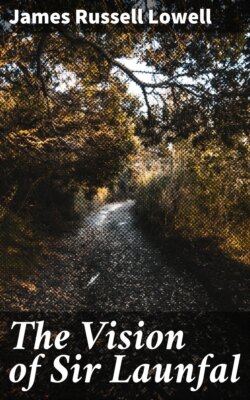Читать книгу The Vision of Sir Launfal - James Russell Lowell - Страница 7
На сайте Литреса книга снята с продажи.
EDUCATION.
ОглавлениеTable of Contents
His acquaintance with books and his schooling began early. He learned his letters at a dame school. Mr. William Wells, an Englishman, opened a classical school in one of the spacious Tory Row houses near Elmwood, and, bringing with him English public school thoroughness and severity, gave the boy a drilling in Latin, which he must have made almost a native speech to judge by the ease with which he handled it afterward in mock heroics. Of course he went to Harvard College. He lived at his father's house, more than a mile away from the college yard; but this could have been no great privation to him, for he had the freedom of his friends' rooms, and he loved the open air. The Rev. Edward Everett Hale has given a sketch of their common life in college. "He was a little older than I," he says, "and was one class in advance of me. My older brother, with whom I lived in college, and he were most intimate friends. He had no room within the college walls, and was a great deal with us. The fashion of Cambridge was then literary. Now the fashion of Cambridge runs to social problems, but then we were interested in literature. We read Byron and Shelley and Keats, and we began to read Tennyson and Browning. I first heard of Tennyson from Lowell, who had borrowed from Mr. Emerson the little first volume of Tennyson. We actually passed about Tennyson's poems in manuscript. Carlyle's essays were being printed at the time, and his French Revolution. In such a community—not two hundred and fifty students all told—literary effort was, as I say, the fashion, and literary men, among whom Lowell was recognized from the very first, were special favorites. Indeed, there was that in him which made him a favorite everywhere."
Lowell was but fifteen years old when he entered college in the class which graduated in 1838. He was a reader, as so many of his fellows were, and the letters which he wrote shortly after leaving college show how intent he had been on making acquaintance with the best things in literature. He began also to scribble verse, and he wrote both poems and essays for college magazines. His class chose him their poet for Class Day, and he wrote his poem; but he was careless about conforming to college regulations respecting attendance at morning prayers; and for this was suspended from college the last term of his last year, and not allowed to come back to read his poem. "I have heard in later years," says Dr. Hale, "what I did not know then, that he rode down from Concord in a canvas-covered wagon, and peeped out through the chinks of the wagon to see the dancing around the tree. I fancy he received one or two visits from his friends in the wagon; but in those times it would have been treason to speak of this." He was sent to Concord for his rustication, and so passed a few weeks of his youth amongst scenes dear to every lover of American letters.
